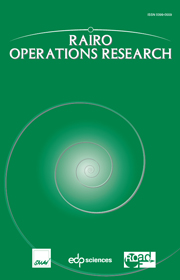Article contents
A note on robust Nash equilibria with uncertainties∗
Published online by Cambridge University Press: 30 April 2014
Abstract
In this short note, we investigate the framework where agents or players have some uncertainties upon their payoffs or losses, the behavior (or the type, number or any other characteristics) of other players. More specifically, we introduce an extension of the concept of Nash equilibria that generalize different solution concepts called by their authors, and depending on the context, either as robust, ambiguous, partially specified or with uncertainty aversion. We provide a simple necessary and sufficient condition that guarantees its existence and we show that it is actually a selection of conjectural (or self-confirming) equilibria. We finally conclude by how this concept can and should be defined in games with partial monitoring in order to preserve existence properties.
- Type
- Research Article
- Information
- Copyright
- © EDP Sciences, ROADEF, SMAI, 2014
References
- 4
- Cited by




